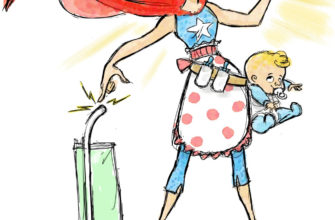
1. If, after the appearance of the baby, a woman, instead of joy, feels longing and breakdown, does this mean that she was not ready for motherhood?
Most women experience postpartum spleen (“baby blues”) in the first month after birth. This is a normal condition that disappears within a month. If after this period the mood of the young mother does not return to normal, she needs the help of a specialist psychologist.
2. How is postpartum depression diagnosed?
It is safe to say that a woman can be depressed if there are at least three or more symptoms of PD and they do not disappear within a month. An accurate diagnosis can only be made by a therapist, offering the woman special tests and questionnaires.
3. Can there be PD in men?
After the birth of the baby, not only mothers, but also fathers can suffer from depression (postpartum depression in fathers: why it occurs and how to help a young dad) If a man feels causeless anguish, anxiety, constant anxiety, apathy, unwillingness to care for a child - he needs to see a psychotherapist.
4. Can postpartum depression begin during pregnancy?
Sometimes a woman begins to experience depression during the period of expectation of the baby. But this condition is called prenatal depression. According to statistics, up to 20% of expectant mothers experience it. Psychologists have shown that prenatal depression increases the risk of postpartum depression.
5. Can PD develop within a few months after giving birth?
Yes, the likelihood of developing depression persists for a year after childbirth.
6. How to cope with depression, if it is not possible to consult a specialist?
In the absence of the opportunity to consult a specialist, it is necessary to create favorable conditions in the house for the well-being of the woman. All negative factors contributing to the development of an oppressed state should be eliminated. If a young mother is annoyed by household problems or uninvited guests, you should not be forced to endure these inconveniences. Most of the time should be given to rest, communication with the baby. Light physical exercises, meditation, walks in the fresh air positively affect the psychological state.
7. What if relatives do not believe in postpartum depression?
Relatives need to be explained that this condition is an officially recognized form of depressive disorder, and not just the vagaries of a young mother. To do this, show them medical articles on the Internet or invite them to a joint psychotherapy session.The close people of the young mother should understand that without their help and support she cannot cope with her oppressed state.
8. If the mother did not have depression with her first child, does this mean that she will not arise with the second?
The fact that a woman was able to survive the birth of her first child without depression does not mean at all that after the appearance of the second or next child she will not be susceptible to depression. Depression can occur after any birth, it is impossible to predict. According to doctors, women who become mothers for the second or third time are at particular risk. After all, they must simultaneously take care of the newborn and older children, which leads to emotional exhaustion.
9. Do I need to treat postpartum depression if many women resolve it on their own?
If postpartum depression is left unattended, it can become extremely dangerous for a woman’s health and life — postpartum psychosis. In addition, being depressed, a woman ceases to feel the joy of life, enjoy communicating with her baby and her new status as a mother. The first year of a child’s life is a special time for young parents and the child, and it should be happy. It is necessary to try so that nothing overshadows these happy months.
READ ALSO:
- Postpartum Depression: 10 Tips to Get Rid of Depression After Childbirth: Signs and Causes of Depression (A lot of real video)
- How to Avoid Depression on Maternity Leave
- 6 worst tips you can give your mom in postpartum depression
- How to stay crazy after childbirth - tips for young mothers
- Postpartum psychosis - causes, symptoms, treatment
My experience: revelations about postpartum depression








